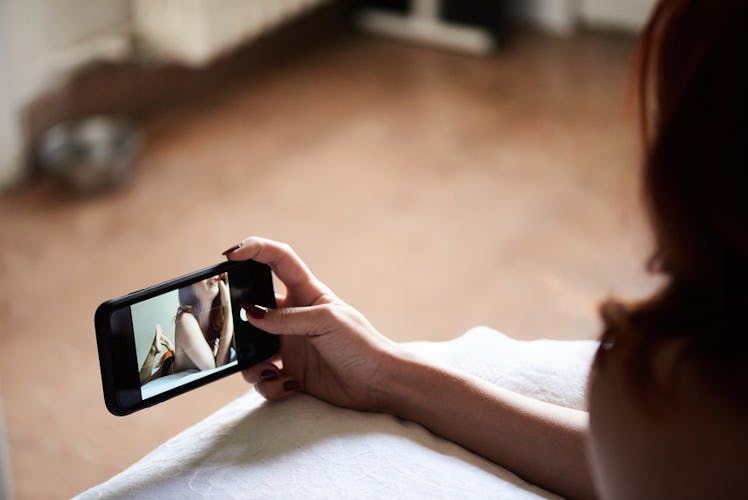
4 Ways To Stay Safe While Sexting, Because It's Just As Important As Safe Sex
Just like sex, sexting is an intimate exchange of energy. You might not be sharing bodies or bodily fluid, but you are still sharing an aspect of yourself with the other. The number one rule of how to practice safe sexting is to ensure that the person you're sharing with is worthy of your energy and time.
Of course, you can't always be completely certain that you know and understand the other person. Surprises and accidents do happen. There's nothing worse than texting the wrong person by mistake, particularly if there are boobs in the shot. That's why it's a good idea to only engage in sexting if you're in a space where you can fully concentrate on what you're doing. In other words: It's probably not a great idea to sext at work.
When it comes to taking pictures of your body, the disconnect of sexting can make you forget that you are still sharing an intimate part of yourself. If you're sexting with someone you don't know very well, it's good to protect yourself by excluding features that would make you identifiable. As soon as the picture leaves your possession, it's essentially out of your control. It's good to take some reasonable precautions. Here's how:
1. Don't Include Your Face
Even if the person you are sharing your image with wouldn't distribute it to others intentionally, a lost phone or SIM card means that your image can get out there. Omitting your face and identifiable features such as birthmarks or tattoos can help ensure your privacy should the unforeseeable happen. And you can still make it sexy.
Dr. Scot Conway, a counselor and mentor, told Mashable that there are plenty of resources to figure out how to take alluring options for sharing your image with others. "An arm draped across the breasts, a topless photo from behind, a side shot, a towel or sheet held in front of the body are all options," he said.
2. Avoid Sexting At Work
With email and other forms of messaging blurring the lines between work and home life, the temptation to blur personal boundaries can be felt at your desk job, too. But sexting at work can land you in serious trouble, particularly if you work at a place which monitors your devices.
There have been plenty of cases that have involved employees using work devices to send personal messages, like this one concerning a police officer in California. Be on the safe side by limiting the personal messages to your personal time, and make sure they're not going out on a work device.
3. Turn Off Automatic Syncing
If you're sexting on an iPhone, chances are high that your device is syncing images and videos to iCloud. On an Android, they're likely uploading to Google photos. That's a good thing for ordinary photos if you should lose your phone, but it's a risk if you're sexting and expecting that your photos are staying on a device. Hackers have accessed the iCloud before, which was how so many celebrity images ended up being leaked back in 2014.
According to Motherboard, even if hackers aren't interested in you, Apple can access iCloud because the company retains the service's encryption keys.
“Unless you use a strong, unique password and have set up two-factor authentication wherever possible, avoid using cloud-based apps that allow you to log in with a username and password from any device,” said independent cybersecurity expert Jessy Irwin in an interview with Motherboard.
You can turn off syncing to a cloud by going to your phone's settings. On an iPhone, go to Settings > Photos > iCloud Photo Library and then toggle the feature to "off." On a device that uses Google photos, you can turn off automatic syncing by going to Settings > Accounts > Accounts & Sync and toggling off the account you don't want to be synced anymore.
4. Don't Keep The Photos
If you're engaging in sexting with your partner, establish some boundaries over whether or not they can keep the photos. All it takes is losing a device to know the horrors of what can happen when an image is out of you or a loved one's control.
"It's best to delete photos just in case you have a habit of losing or leaving your phone lying around — especially without a passcode," psychologist and sex therapist Dr. John W. Beiter said to Mashable.
Even if you have a trusted partner, things can still go wrong after a breakup. No matter how committed your relationship is, take precautions to protect yourself and your image. You're far too valuable to do anything less.
Check out the entire Gen Why series and other videos on Facebook and the Bustle app across Apple TV, Roku, and Amazon Fire TV.
Check out the “Best of Elite Daily” stream in the Bustle App for more stories just like this!